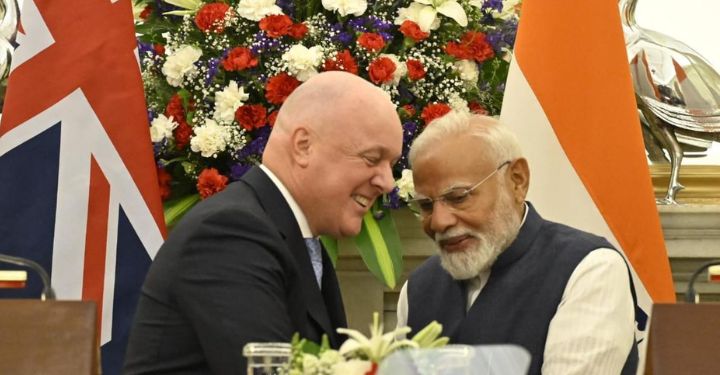In a significant step toward enhancing their strategic cooperation, India and New Zealand have signed a landmark defence agreement aimed at fostering greater security collaboration in the Indo-Pacific region. The pact was finalized during a high-level meeting between Indian Prime Minister Narendra Modi and New Zealand Prime Minister Christopher Luxon in New Delhi, marking a milestone in the diplomatic ties between the two nations.
This defence pact is designed to bolster the bilateral military relationship and expand areas of cooperation, including joint military exercises, intelligence sharing, and cooperation in counter-terrorism initiatives. As the Indo-Pacific region continues to face growing security challenges, both India and New Zealand are committed to ensuring peace, stability, and prosperity in the region, and this new agreement serves as a foundation for that shared vision.
Details of the Defence Agreement
The defence pact between India and New Zealand addresses key security issues that both countries have been focusing on for years. A primary focus is the enhancement of joint military exercises, which will involve forces from both countries participating in training sessions designed to improve interoperability and coordination. The goal is to ensure that the military forces from both nations are better prepared to respond to a range of security challenges, whether they be natural disasters, terrorism, or military threats.
Another key element of the pact is increased cooperation in cybersecurity. As global reliance on digital infrastructure grows, so too does the threat of cyber-attacks. The agreement establishes frameworks for information sharing and collaboration in identifying and mitigating cyber threats, thereby strengthening both nations’ defences against cyber espionage and cyber warfare.
Moreover, the pact emphasizes the importance of maritime security. Given the strategic location of both countries within the Indo-Pacific, securing vital sea lanes and protecting maritime trade routes is critical. The agreement ensures that India and New Zealand will work together to safeguard these routes and to promote the principles of freedom of navigation in international waters. This also includes efforts to combat piracy and other illegal activities in the maritime domain.
Geopolitical Context and Strategic Significance
The Indo-Pacific region is increasingly seen as a central area of global geopolitical competition. In recent years, tensions in the South China Sea, the rise of China’s military and economic influence, and concerns about regional security have led to greater calls for multilateral cooperation. Both India and New Zealand have long recognized the importance of maintaining peace and stability in this critical region.
India, with its growing economic and military power, plays a significant role in the security landscape of the Indo-Pacific. Similarly, New Zealand, situated strategically in the Pacific, is committed to contributing to the region’s peace and security. The defence pact is a testament to both nations’ shared commitment to uphold international law and support a rules-based order in the Indo-Pacific.
The agreement also reflects the growing importance of small and medium-sized nations like New Zealand in shaping global security dynamics. While India has been an influential player in regional security affairs, New Zealand’s proactive role in the Pacific is becoming increasingly vital. The collaboration between the two nations will help address common challenges, while also allowing them to influence the broader regional security architecture.
Expanding Bilateral Relations
While the primary focus of the agreement is on military cooperation, the defence pact also signals a broader intention to deepen ties between India and New Zealand in other key areas. The two leaders, Modi and Luxon, discussed expanding trade relations, enhancing educational exchanges, and strengthening people-to-people ties during their meeting.
The two nations have long enjoyed a cordial relationship, but the signing of this defence pact marks a new era of cooperation. The security collaboration is expected to have a positive ripple effect on other aspects of the bilateral relationship. With both nations seeking to diversify their trade relationships, New Zealand is looking to India as an important economic partner, while India sees value in expanding its ties with New Zealand, especially in sectors such as agriculture, technology, and sustainable development.
Counter-Terrorism and Transnational Security Challenges
A critical aspect of the defence agreement is the shared commitment to counter-terrorism efforts. Both India and New Zealand have faced security challenges related to terrorism in recent years, and the pact provides a framework for closer collaboration in intelligence sharing and counter-radicalization programs. With both nations being members of various international counter-terrorism organizations, the partnership is expected to enhance their collective ability to combat global terrorism.
The pact also highlights the importance of working together to address other transnational security threats, such as organized crime, human trafficking, and drug smuggling. By strengthening their security ties, India and New Zealand aim to create a safer environment for their citizens while contributing to regional and global stability.
For More News updates : https://asiapedia.in
